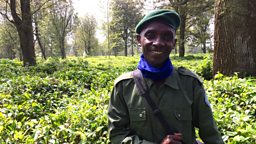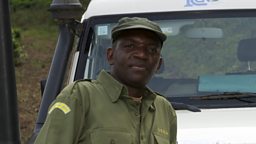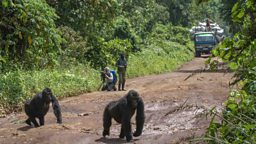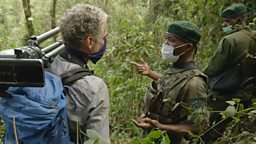Filming Mpungwe
This page was edited on 2nd January 2024 as it incorrectly suggested Mpungwe had been habituated.
It is thundering, with heavy rain falling outside. In a bare office built of rough stone at the headquarters of Kahuzi-Biega National Park, high up in the hills at Tshivanga, in South Kivu Province, Democratic Republic of Congo, Robert Mulimbi shows me pictures which blow my mind.
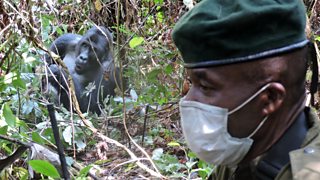
I have been filming here for 6 weeks over the summer, along with some of the best wildlife photographers on the planet. Yet I have never seen images like these. They’re a bit out of focus, admittedly, and not exactly well framed. But they’re special. They’re selfies, taken by Robert and his team of 3 trackers, in intimate proximity with a silverback Grauer’s gorilla known as Mpungwe.
This is a huge, and exceptionally powerful wild animal. When I first met him, in April 2015, he charged repeatedly, beat his chest, shrieked, retreated, charged again, and above all wouldn’t let himself be seen, let alone photographed.
Yet in these shots, he looks completely relaxed. His facial expressions are those of a curious, interested friend. It’s as if he’s a willing part of the selfie. Just chilling, enjoying the moment. You can sense the trust and understanding between him and the trackers. It’s a glimpse of an extraordinarily rare and courageous relationship between humans and great apes that has inspiring implications for the future of gorillas everywhere.
The following are the words of Robert:
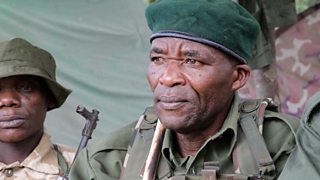
“I was born close to the Park. During primary school, I used to go into the forest to look at the birds, and the animals – because in those days there were still a lot of animals. We had lots of monkeys, and even lots of gorillas too. Baboons used to come and raid our corn crops, marrows and beans, and I’d watch them – I was so happy.
“Three or four of us used to go into the bamboo and hunt birds with catapults. The gorillas were very aggressive back then, and the first time I saw a gorilla, I was around 12 years at the time, it charged, and I burst into tears, and ran away, I was very frightened.
“Ba’kongo – the tracker – was my teacher. I used to call him the Professor. He really saw the gorillas, he knew so much about them. He grew up in the forest, and lived like other pygmies, hunting animals. At that time, the pygmies were converted, moved out of the forest so that it could be preserved as a national park, so that poaching could be stopped. Like Ba’kongo, many of them were invited to train as trackers. This gave them an income, the ability to buy clothes and food, and they were able to look after their families, and even their brothers who didn’t have work.
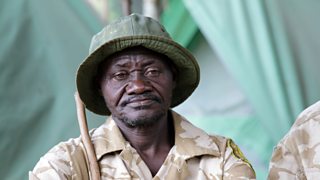
“Jean-Paul – the other pygmy tracker in our team, was hired later, he was younger. At that time, there were lots of pygmies still entering the park clandestinely, to poach and hunt, and Jean-Paul was caught and retrained as a tracker
“When tourists arrive here, they need to have options to visit different families. And if we have higher numbers of tourists, we must be able to vary which gorillas they meet. That’s why we need to habituate Mpungwe. That’s my great hope.”
And the words of Robert’s deputy Paulin, who likes to take photographs:
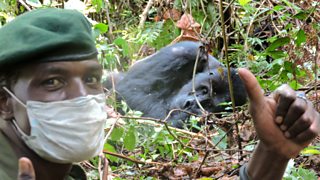
“During the 1990s, I was part of a small team following a family of three individuals with a silverback. This male was called Chimanuka. At that time, he was mainly interacting with another family whose leader was called Mufanzala. In 1999, he stole a female from Mufanzala’s group; her name was Makali, the eventual mother of Marhale.
Subsequently, Chimanuka started trying to steal females from Mugaruka, who had lost his hand in a snare when he was an infant. This ought to have prevented Mugaruka from becoming a dominant male. Yet because so many silverbacks were killed during the war, Mugaruka, only a blackback at the time, had risen to become a dominant male with a large family of females, all of whom were seeking mates in the absence of males because of the killing. Even so, Chimanuka was too powerful for him at that time. Having seduced all of Mugaruka’s females, all of whom are still with Chimanuka today, he killed their infants, and had his own children with them.”
Interview and text by assistant producer Patrick Evans
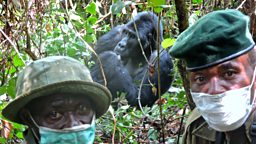
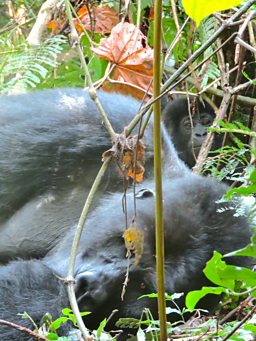
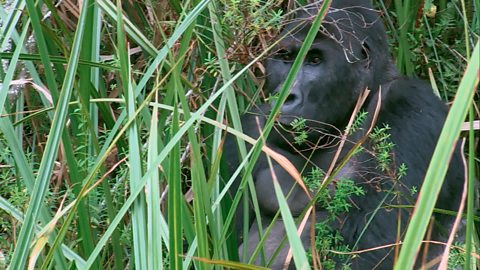
Mpungwe and the swamp
Gordon tracks Mpungwe to a swamp.
